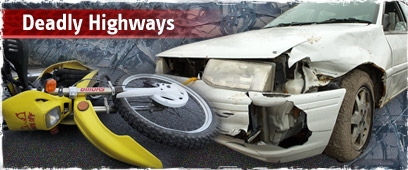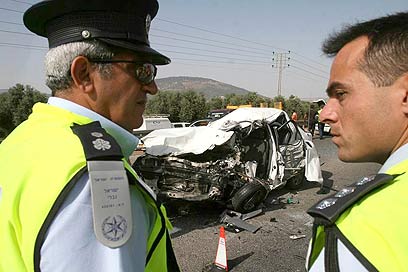

When one thinks about a fatal car crash, images of chaos come to mind: The car, turned into a crumpled piece of metal, personal belongings scattered everywhere, cries of pain – all mesh into one terrifying picture.
Israel's highways have claimed more than 300 lives since the beginning of 2008. Three hundred families whose lives were turned upside down in a spilt second – in a single moment when someone rang the doorbell.
They are the people you never want to meet. "Angels of death" – some have called them, heralds of the worst kind of news; they are the Israeli Police Department's casualty officers, tasked with the daunting mission of identifying car crash victims and tracking down their families.
The growing death toll claimed by Israel's highways ensures they are never out of work. They, as we found, are on-call 24 hours a day, seven days a week. Their hands are always full. Too full.
The Israeli Police Department has six senior casualty officers, one for each of the five districts and their Chief Superintendent Eran Feinmesser. The busiest of all is the Northern Police District's casualty officer, while his Jerusalem counterpart is the one with the most "free time," but all of them are called on at least several times a week – sometimes several times a day.

People you never want to meet (Archive photo: Hagai Aharon)
They meet families – parents, husbands, wives, brothers, sisters and children – and share the most emotionally painful and intimate moments of their lives. They each remember the names and faces of the people they broke the news to. Many of the families keep it touch, they said, sometimes for years.
Every few months, casualty officers are required to undergo resilience training: They speak with psychologists and guidance counselors, who help them cope with the hardship of their day-to-day operations; but their real strength, they said, is mostly derived from each other.
"That moment, just before you knock on somebody's door is a very problematic moment," said Superintendent Moshe Bar-Or, of the Judea and Samaria Police District. "Your stomach is turning. We're always very nervous. We don’t know who will be answering the door."
"When you spend you day dealing with irreversible things, everything else, anything you can do over, loses importance," added Superintendent Eyal Guttmna, of the Southern Police District.
"If we could just let people see what it's like for once, when you knock on a door and an entire family is shattered before your eyes, how fragile everything and how much pain and suffering it entails, how it scars entire generations… maybe we could make people stop and think for a minute before they act," reiterated Feinmesser
There's this notion, they concluded, that the freeway is like a war zone and it shouldn’t be like that. "The car and the highways are means to get from point A to point B and back. That's all."















